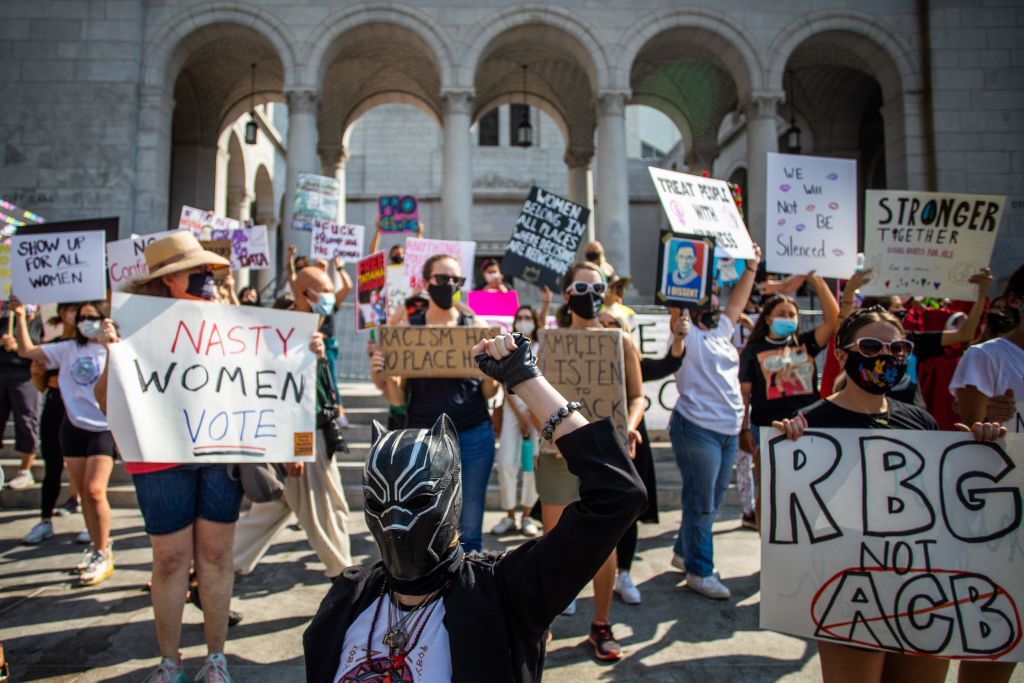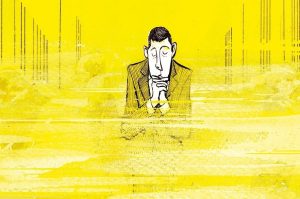Last week, a group of academics published a report that showed over 40 percent of Americans think violence might be justified if the other side wins the election. Both sides talk of the other ‘stealing the election’. Each side claims this is the most important election in US history. For the first time in generations, there’s a sense that the US election could prompt skirmishes, blood in the streets.
‘What would the military do?’ people ask. In the world’s most powerful democracy, a nation that fetishizes its Constitution, and obsesses over its checks and balances, how did we come to this?
‘Polarization’ is a word we’ve heard a great deal these last years. Polarization is behind the global populist surge, polarization explains today’s culture wars. It’s not just at the macro level of MAGA vs BLM. Think of the spitting hatred inside like-minded communities: trans activists vs radical feminists, Bernie bros vs Biden leftists. Everywhere we look, the conversation has got nastier. The tribal camps have dug in and weaponed-up.
The Pew Research Group has been tracking polarization across the US since the late 1980s. Thirty years ago, Americans were far more fluid in their politics — more pick ’n’mix. Free-market Republicans could also happily support some gun control or a woman’s right to choose. Today, sides go all in on their political programs. They have sorted fully into their ideological camps, and they show growing contempt for those outside them.
To understand what’s happening in America and in other Western democracies, we have to see polarization as two distinct phenomena: political polarization and belief polarization.
Political polarization describes our ideological divergence: the political distance between liberal and conservative views. And while Americans have grown further apart on key political questions — immigration, big vs small government, whether systemic inequality even exists — they have also come a lot closer on others. Around the ‘moral’ policy questions of the 90s, for example (abortion, LGBT rights), there’s now very broad consensus across party lines.
Political polarization is not the problem. We’ve seen it before. The 1970s were far more politically polarized, pitting hard socio-economic conservatism against a radical anti-war communitarian socialism, but there was little sense than that voters felt their democracies were at stake.
The problem is belief polarization: the measure of how we feel about the other side. And here the results are chilling. Today, almost half of all Americans feel ‘extremely unfavorable’ towards their partisan opponents (three times more than 20 years ago). Each side’s view of the other side’s leader (Democrats on Trump, Republicans on Biden) has drastically degraded since 2000. Each side sees talks of the other as a threat to democracy.
Perhaps most strikingly, more than half of Americans would be distraught at the prospect of their children ‘marrying out’ politically. Where once we discriminated around race, religion, sexuality or social class, we now do so around politics. Politics are our new tribes. Belief polarization has taught us to see the other side not merely as wrong-headed, but as profoundly ‘other’: intellectually deviant and morally corrupt.
So where has all this come from? And why is it so much worse than it has been?
There’s the macro moment: globalization, the redrawing of the global map of power, and the end of the Cold War, where we lost an enemy around which to rally as a country. Then set all that on fire with 2008, a crisis that deepened divisions and forged a strong sense of ‘us vs them’ politics. Events of great political and economic upheaval are frightening, and they send us running for political shelter and protection in numbers.
Then there’s the information ecosystem. Fox News and MSNBC, founded within four months of each other in 1996, aid, abet and monetize the polarization of each side. In turn, they inspired an avalanche of partisan copycat sites, from Breitbart to Jacobin.
The tech platforms carry an outsized share of the blame too. With algorithms designed to show us stories that trigger emotion 👍❤️🤣😮😢😡, they pushed us into our tribal camps, taught us respond to the other side with feeling rather than thought.
Finally, two key features of the broader cultural context also played a role.
Geography: it’s easier to dehumanize the other side when you’ve never met them. And today, Democrats and Republicans don’t meet in their news or social channels and they don’t meet in real life either — because they live in different places. The politics of America can be seen across its landscape: Democrats live in cities; Republicans live outside them. Social and physical mobility in the US has ghettoized its politics.
And God: religiosity has declined almost everywhere around the world, but nowhere more than the US. Once the religious outlier among the world’s high-income countries, America is now the 12th least religious country in the world. Politics has become identity, replacing religion as the source of meaning in people’s lives. We’re no longer Southern Baptist, Jewish or Catholic; we’re progressive or conservative. Our political identities have become who we are. No wonder we see those whose opinions differ from ours as enemies.
So: back to those two strands of polarization. Political polarization — the breadth of our political ideas, and the distance we are from each other — is good for us. Consensus is often the polite term for groupthink; debate is how democracy is made. Belief polarization — the demonization of the other side — is disastrous precisely because it undermines democracy.
At the heart of democracy is the idea of the ‘Loyal Opposition’ — the whetstone of better politics, the guarantor of accountability. If we think of Russia, China or Belarus, the most recognizable feature of undemocratic states is precisely the absence of opposition. Belief polarization is destroying that idea of the Loyal Opposition.
[special_offer]
‘At stake is the survival of our nation because we’re dealing with crazy people on the other side,’ said Trump outside Biden’s birthplace in Scranton, Pennsylvania in mid-August, ‘Joe Biden…seeks to destroy the American way of life.’
‘The greatest threat to American democracy since World War Two,’ was the lead in the New York Times’s editorial board op-ed last Saturday. The Guardian headline says, ‘Trump vs American Democracy’.
The charges being leveled by either side are now existential. This isn’t about politics or policies so much as the identity of the American nation. Far from being the Loyal Opposition, the democratic Yang to whoever is the ruling Yin, liberals and conservatives increasingly see the other side as an obstacle to democracy — unworthy of shared participation in the democratic project, illegitimate.
That’s why it feels like there’s a powder keg under this November election. Democracies work when we see the other side as a partner not an enemy. When that idea is damaged, there is everything to fight for, and nothing to fight for together.
Turi Munthe is the founder of Parlia, the encyclopedia of opinions.


















